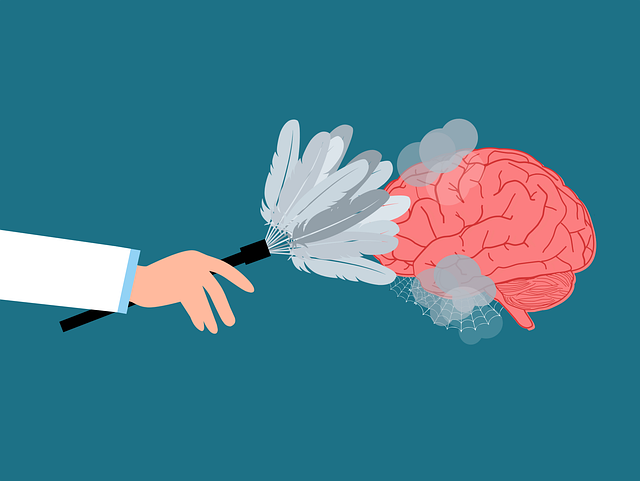Northglenn Major Life Transitions Therapy employs Recovery-Focused Methodology (RFM) to build mental resilience through journaling, risk assessment, and talk therapy. This holistic program helps individuals manage life changes like job loss or breakups by uncovering strengths and fostering effective coping strategies. Implementing Resilience Exercises in group sessions promotes positive thinking and growth from challenges. Success is measured using multi-faceted approaches including client feedback, self-assessments, and behavioral observations, ensuring continuous improvement and refinement of therapy techniques.
“Uncover the power of Resilience Building through RFM (Recovery Factor Method) in Northglenn Major Life Transitions Therapy. This comprehensive guide explores how tailored exercises can enhance mental fortitude during life’s challenges. We delve into the holistic approach adopted by Northglenn’s leading therapists, offering a strategic framework for effective change. From understanding RFM’s role to measuring success, this article provides valuable insights for those seeking to navigate life transitions with resilience and adaptability.”
- Understanding RFM and Its Role in Resilience Building
- Northglenn Major Life Transitions Therapy: A Holistic Approach
- Implementing Resilience Exercises: Strategies for Effective Change
- Measuring Success and Continuous Improvement in Therapy
Understanding RFM and Its Role in Resilience Building

Resilience is a critical component of overall mental wellness, especially during challenging times and major life transitions. This is where RFM (Recovery-Focused Methodology) comes into play as a powerful tool in Northglenn Major Life Transitions Therapy. By focusing on an individual’s strengths, resources, and coping skills, RFM helps individuals navigate through difficult experiences and build resilience. It encourages people to develop effective coping strategies, fostering mental wellness and enhancing their ability to cope with life’s curveballs.
The implementation of RFM involves various exercises designed to strengthen one’s mental resilience. For instance, journaling can be a valuable Mental Wellness Journaling Exercise Guidance, allowing individuals to reflect on their experiences, identify personal strengths, and track progress over time. Additionally, risk assessment is an essential aspect for mental health professionals, helping them tailor interventions and provide appropriate support while ensuring client safety. This approach not only aids in coping skills development but also empowers individuals to embrace change and emerge stronger from life’s transitions.
Northglenn Major Life Transitions Therapy: A Holistic Approach

In Northglenn, Major Life Transitions Therapy offers a holistic approach to empowering individuals through challenging life changes. This innovative program recognizes that managing significant transitions, whether it’s losing a job, dealing with a breakup, or adapting to retirement, requires more than just external support. It delves into the internal landscape, focusing on depression prevention and cultivating inner strength development. Through a combination of talk therapy, mental wellness journaling exercises, and guidance from seasoned professionals, participants gain the tools needed to navigate these transitions with resilience.
The Northglenn Major Life Transitions Therapy is designed to help individuals uncover their inherent capabilities and build coping mechanisms that enhance overall mental wellness. By engaging in this therapeutic journey, participants learn to embrace change as an opportunity for growth rather than a source of overwhelming stress. Through evidence-based practices and personalized attention, the program ensures that each individual leaves with a renewed sense of purpose and the skills to thrive in the face of life’s challenges.
Implementing Resilience Exercises: Strategies for Effective Change

Implementing Resilience Exercises is a strategic approach to navigating Northglenn Major Life Transitions Therapy with success. These exercises are designed to equip individuals with essential coping skills development, enhancing their ability to manage and overcome challenges. By integrating resilience-building activities into therapy sessions, professionals can foster mental health awareness and promote positive thinking. This proactive method enables clients to develop a mindset that views setbacks as opportunities for growth rather than insurmountable obstacles.
Effective strategies include tailoring exercises to individual needs, ensuring a safe and supportive environment, and incorporating a variety of engaging activities. Group sessions can facilitate a sense of community, allowing individuals to share experiences and learn from one another. These collaborative efforts can strengthen the therapeutic bond and enhance the overall effectiveness of Northglenn Major Life Transitions Therapy.
Measuring Success and Continuous Improvement in Therapy

Measuring success is a vital aspect of Northglenn Major Life Transitions Therapy, ensuring that clients experience tangible improvements in their lives. Therapists employ various methods to evaluate progress, from client feedback and self-assessments to structured interviews and behavioral observations. This multi-faceted approach allows for a comprehensive understanding of each individual’s journey, identifying areas of growth and pinpointing specific challenges that require further attention.
Continuous improvement is fostered through regular review and refinement of therapy techniques. By analyzing the outcomes of various interventions, therapists can adapt their strategies to better support clients. This iterative process encourages the integration of innovative practices, such as promoting positive thinking, teaching conflict resolution techniques, and implementing burnout prevention strategies. Such ongoing optimization ensures that Northglenn Major Life Transitions Therapy remains effective and responsive to the evolving needs of its clients.
The implementation of RFM and resilience-building exercises, as showcased by Northglenn Major Life Transitions Therapy, offers a powerful framework for personal growth. By combining holistic practices with targeted strategies, this approach equips individuals with the tools to navigate life’s challenges. Through effective change management techniques, therapy participants gain enhanced resilience, enabling them to embrace transitions and thrive in a dynamic world. Continuous improvement is measured through thoughtful assessment, ensuring that Northglenn Major Life Transitions Therapy remains a leading force in fostering resilience and well-being.














